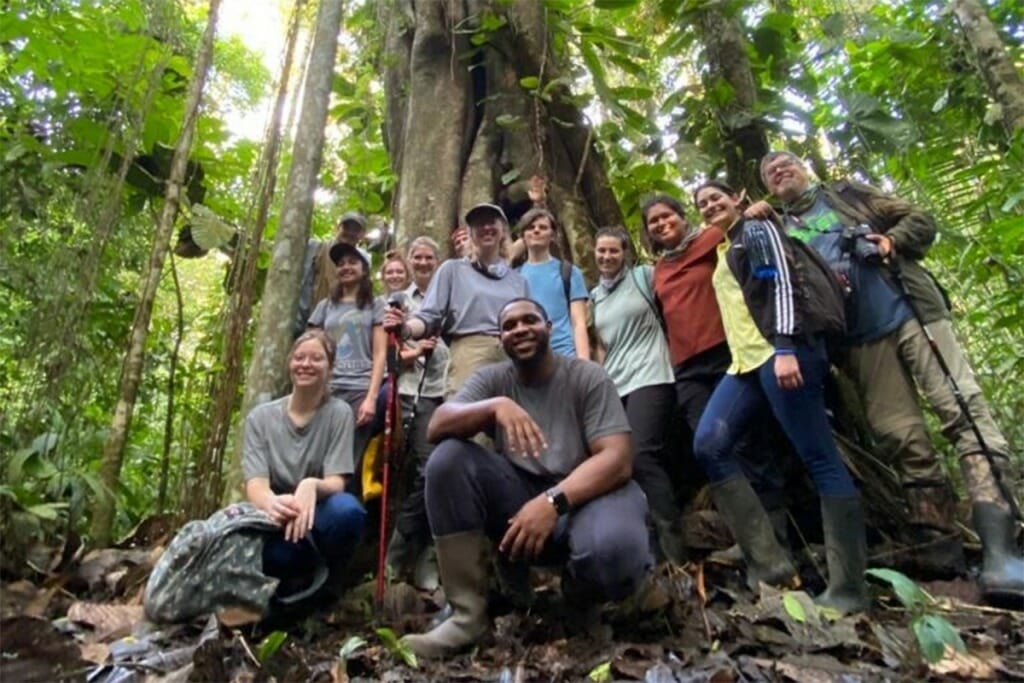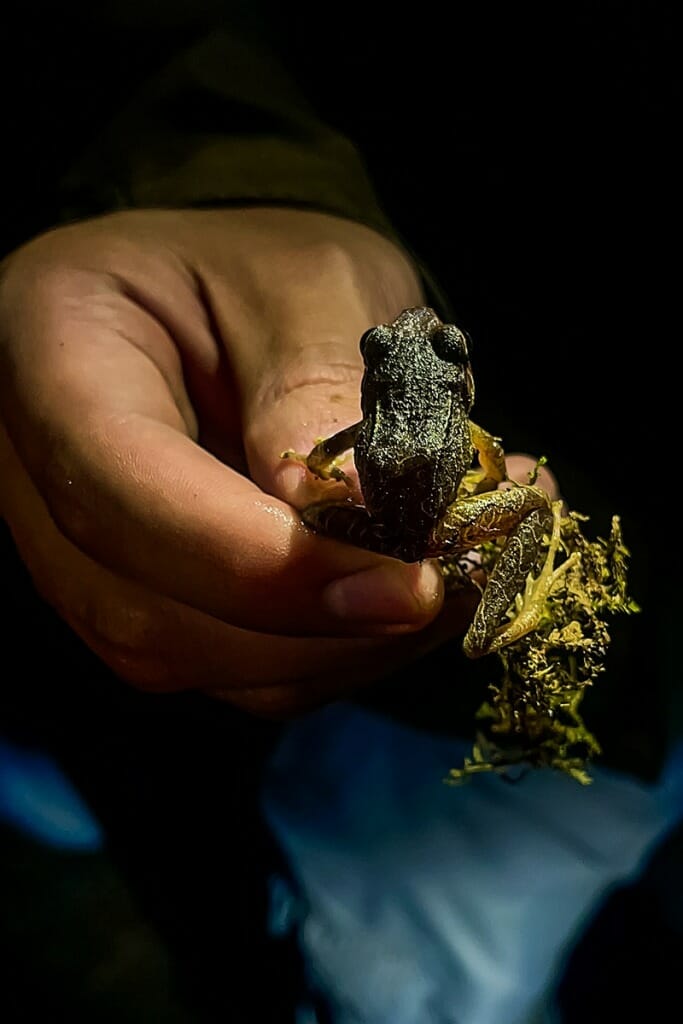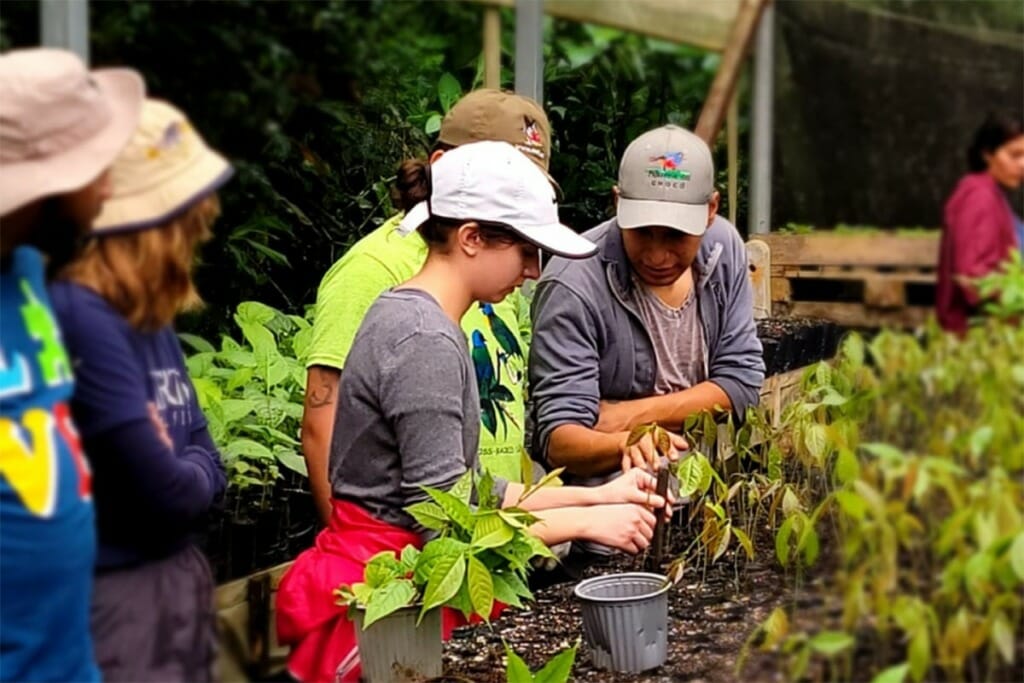
A trip to Ecuador and the Galapagos on Jan. 4-14 gave 11 Liberty University students, mostly from the Department of Biology & Chemistry, the chance to explore and interact with the natural world.
This marks the fourth trip to Ecuador that biology professor Dr. Kyle Harris has led along with biology professor Dr. Cindy Bunker and in coordination with LU Send, which facilitates all student group travel and experiential learning opportunities in the U.S. and abroad. This year, students were able to earn their Creation Studies (CRST 290) course credit through the trip, thanks to a partnership with Liberty’s Center for Creation Studies.
“It was a sort of special topics course where students could not only travel to the Galapagos and the jungles of Ecuador, but they could also think about what they’re seeing and experiencing in relation to origins and Creation,” Harris said. “There are so many things left to be learned about the created order. God has packed all of this complexity into His Creation, and we have to go out there and unravel it, but to do that you have to be present.”
Each morning, the group would gather for breakfast and a devotion before leaving to work with Tropical Herping, a local biodiversity organization that focuses on preserving the unique reptiles and amphibians of the area through tourism, photography, research, and education.
The group’s time in Ecuador was spent largely in the nearby jungle, participating in a reforestation project and conducting night surveys for the seemingly infinite species that can be found in the region.

“For the reforestation, the students went out and found little sapling trees, dug them up, potted them, and placed them in a greenhouse, and then planted some older trees that had been in the greenhouse in a place that was being reclaimed for the jungle,” Harris explained. “Then, because most things in the jungle are most active at night, we would go out late at night with our headlamps on and find all kinds of frogs, lizards, snakes, tarantulas, and other kinds of animals. We even helped the scientists there look for unique species that they had been looking for as part of their own research.”
For the final two days of the trip, students boarded a plane to the Galapagos Islands and donned their snorkeling gear to explore off the coast, swimming with sea turtles, schools of fish, and dolphins while peering below to see hammerhead and white-tip sharks and looking to land to see a wide variety of birds.
The snorkeling portion of the trip was a highlight for junior biology student Emmanuel Johnson and senior biomedical sciences student Ivana Quintanilla.
“I had never been snorkeling before or been out of the United States before, so it was my first time really being in the water and seeing that kind of diverse life with my own two eyes,” said Johnson, who plans to study and work in marine biology. “I told Dr. Harris while we were on the trip that that experience was a confirmation for me that I have to study marine biology, it’s too amazing to not do it. I’m so hungry for more of that experience.”
“When me and the other girls went out, we got to see dolphins and swim through schools of fish, it was so amazing,” Quintanilla said. “Dr. Harris told us it was the most biodiverse snorkeling trip he’s ever been on.”

Quintanilla added that even though she had learned about conservation in the classroom, walking through the jungle and participating the reforestation efforts in Ecuador gave her a better idea of how we can care for the natural world.
“Even though I’d learned conservation in my classes, I never really understood it as much until this trip,” she said. “It really opened my eyes spending time in the jungle and learning how our everyday actions can affect the biodiversity of places like that.”
That firsthand experience in another country is what trips like this are all about, Harris said, and he looks forward to his next trip with students.
“It’s about taking students into an international setting where they can interact with a totally different environment,” he said. “It’s a very different culture and very different food, but also very different plant and animal life than they’re used to in the United States. Having wild animals within a few feet of you, there’s a lot of excitement when the students get to see that.”
The department’s next trips will take students to Panama in May, Costa Rica in August, and Ecuador next January. While the roster for the Panama trip is already full, students from any area of study can register for the Costa Rica trip on the LU Send webpage. Registration for the next Ecuador trip will open later this year.
"creation" - Google News
February 09, 2022 at 02:20AM
https://ift.tt/cyD4XjZ
Students explore the complexity of Creation during trip to Ecuador, Galapagos Islands » Liberty News - Liberty News
"creation" - Google News
https://ift.tt/hvI84Qg
https://ift.tt/g2yUxBC
Bagikan Berita Ini














0 Response to "Students explore the complexity of Creation during trip to Ecuador, Galapagos Islands » Liberty News - Liberty News"
Post a Comment